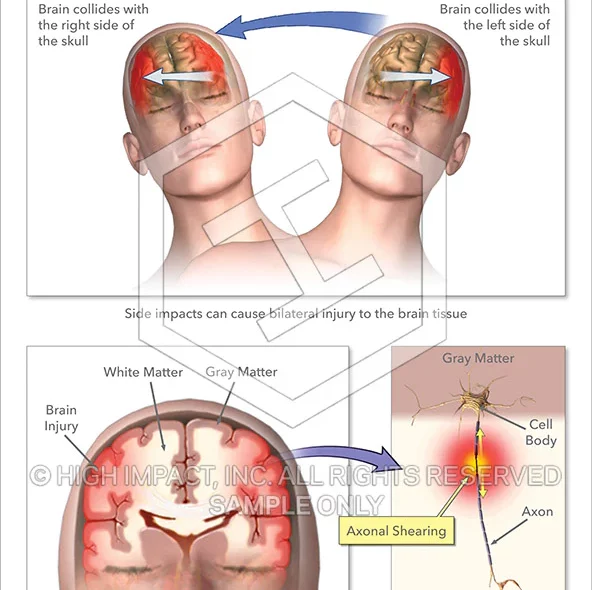Introduction to Traumatic Brain Injury
We understand that traumatic brain injury (TBI) is a complex medical condition caused by external mechanical forces that disrupt normal brain function.
TBIs vary widely in severity from mild concussions to severe, life-altering injuries.
In this article, we present a thorough, structured review of early indicators, medical & rehabilitative treatments, long-term life considerations, and how a traumatic brain injury expert witness can provide critical value in legal and forensic scenarios.
Early Warning Signs & Classification of Traumatic Brain Injury
Mild, Moderate & Severe Classifications
- Mild TBI: often compared to concussions; may not involve loss of consciousness or only brief periods.
- Moderate / Severe TBI: may include extended unconsciousness, evident structural damage (bleeds, contusions), or lasting neurological deficits.
Typical Early Signs and Symptoms
| Domain | Common Early Signs |
| Physical | Headache (may persist for weeks), dizziness or vertigo, nausea or vomiting, blurred vision, ringing in ears, fatigue. |
| Cognitive | Confusion, memory lapses, difficulty concentrating, slowed thinking, trouble with executive functioning. |
| Sensory / Perceptual | Light or sound sensitivity, visual disturbances. |
| Emotional / Behavioral | Mood changes, irritability, anxiety, depression. |
| Sleep | Changes in sleep pattern: insomnia or sleeping more. |
Even seemingly mild trauma can cause symptoms that evolve over days or weeks.
Diagnostic Pathways & Medical Treatment Strategies
Diagnostic Protocols
- Initial assessment
- Neurological exam, checking consciousness, pupil response, motor strength.
- Use of standard scales (e.g. Glasgow Coma Scale).
- Neuroimaging
- CT scan in emergency to detect hemorrhages, skull fractures or acute bleeding.
- MRI for more detailed structural damage / diffuse injury.
- Neuropsychological testing
- Assess cognition, memory, attention, executive functioning, emotional changes.
Acute Medical Management
- Stabilize airway, breathing, circulation.
- Control intracranial pressure (ICP). Elevated ICP is a dangerous complication that can lead to brain herniation.
- Manage bleeding (intracranial hemorrhage) via neurosurgical procedures (e.g. evacuate hematomas).
- Prevent secondary damage: ensure adequate oxygenation, maintain blood pressure to ensure cerebral perfusion.
Subacute & Rehabilitation Phase
- Multidisciplinary rehabilitation: physical therapy, occupational therapy, speech & language therapy.
- Cognitive rehabilitation targeting attention, memory, executive functions.
- Psychological interventions for mood, anxiety, behavior changes.
Life After Injury: Challenges & Rehabilitation Outcomes
Long-Term Effects & Prognosis
- Some individuals may recover fully; others suffer persistent deficits depending on severity and location of injury.
- Common lasting effects: deficits in attention, planning, memory, slower cognitive processing.
- Emotional and personality changes: disinhibition, reduced social judgment, mood disorders.
Factors Affecting Recovery
| Factor | Influence on recovery |
| Age | Younger patients often recover faster; very young or elderly may have slower or limited recovery. |
| Severity | More severe injuries lead to greater deficits and longer recovery periods. |
| Pre-injury factors | Cognitive baseline, health conditions, prior injuries influence outcomes. |
| Rehabilitation & support | Ongoing therapy, family & social support, adaptive strategies improve long-term functioning. |
Adaptation & Rehabilitation Goals
- Achieve independence in daily living.
- Return to work or educational roles with accommodations.
- Address psychological well-being and social reintegration.
- Use assistive technologies for cognitive or physical limitations.
Role of a Traumatic Brain Injury Expert Witness in Legal Contexts
Why an Expert Witness Matters
- A traumatic brain injury expert witness brings specialized knowledge in medical, neurological, and rehabilitative aspects of TBI.
- They can interpret medical imaging, injury mechanisms, deterministic causal links between trauma and consequences.
- Their opinion helps in quantifying the extent of impairments, prognostic outcomes, and future care needs.
Responsibilities & Contributions
| Domain | Typical Contributions |
| Injury causation | Explain how force, mechanism (impact, acceleration/deceleration, penetration) cause specific brain injury. |
| Severity evaluation | Provide analysis on severity classification (mild, moderate, severe) and correlate with clinical findings. |
| Causation & prognosis | Project future impairments, need for rehabilitation, life adaptation, and financial cost of care. |
| Testimony support | Present evidence in court or arbitration, clarify medical jargon for judges, juries, or legal counsel. |
| Report preparation | Craft a clear expert report, with documentation references, imaging interpretations, rehabilitation needs, and long-term prognosis. |
How They Strengthen Legal Claims
- Demonstrate link between accident or event and neurological deficits.
- Forecast lifelong impact and costs.
- Validate rehabilitative needs or modifications.
- Strengthen credibility of plaintiff / claimant via objective medical evidence.
Best Practices & Recommendations for Patients, Families & Legal Professionals
For Patients & Families
- Seek medical attention promptly after head injury, even if symptoms are mild.
- Keep records: imaging reports, physician notes, therapy progress.
- Engage in rehabilitation as early and consistently as possible.
- Monitor for long-term symptoms (cognitive, emotional, sleep changes).
For Legal Professionals
- Retain a qualified traumatic brain injury expert witness early in case evaluation.
- Ensure expert reviews imaging, test results, rehabilitation records.
- Use expert’s prognosis to estimate future costs, care requirements, and damages.
Conclusion
We provide this comprehensive resource on traumatic brain injury, exploring early signs, diagnostic pathways, treatment, rehabilitation, long-term life challenges, and the vital role of a traumatic brain injury expert witness in legal settings.
With thorough medical understanding and professional expert testimony, individuals and legal teams can recognize the full impact of TBI, advocate for appropriate care and justice, and support long-term recovery and adaptation.
 :
https://concisemedico.co.uk/
:
https://concisemedico.co.uk/

